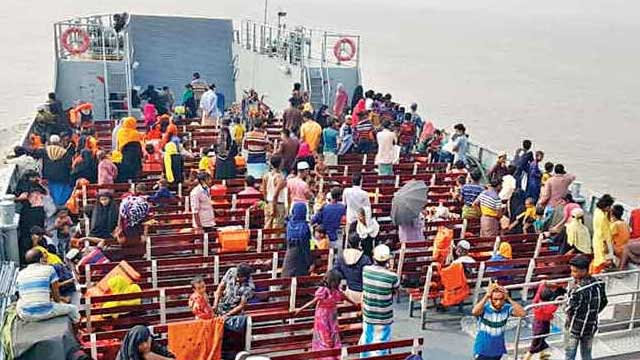The government has relocated about 1,800 forcibly displaced Rohingya people of Myanmar from camps in Cox’s Bazar to Chattogram on Monday.
Cox’s Bazar deputy commissioner Kamal Hossain said that 1,805 Rohingya people of 624 families were transferred to Chattogram for relocating them to Bhasan Char.
They will start for Bhasan Char, an island in Noakhali, from Chattogram at about 10.00am on Tuesday.
Rohingyas, who were willing to go to Bhasan Char, started to gather at the Ukhia Degree College from Sunday afternoon and continued to trickle in till Monday morning, said Abdur Rahim, a Rohingya refugee of Kutupalong Refugee camp under Ukhya police station.
About 50 buses full of Rohingya people left the college field in phases under strict security arrangements, he said.
The government relocated 1,642 Rohingyas in the first batch from the camps in Cox’s Bazar to the island under Noakhali district on December 3.
The government is planning to transfer to Bhasan Char around 1,00,000 Rohingyas of about 11 lakh members of the community to decongest Cox’s Bazar camps situated in areas adjacent to the borders with Myanmar.
The government invested more than $350 million to develop the 13,000-acre island installing amenities like an uninterrupted electricity and water supply, agricultural plots, cyclone shelters, two hospitals, four community clinics, mosques, warehouses, telecommunication services, a police station, recreation and learning centres and playgrounds.
The island is connected with the mainland through waterways.
The United Nations office in Dhaka earlier requested the government to confirm a ‘free and informed decision’ of the Rohingyas based on relevant, accurate and updated information before relocating them from camps in Cox’s Bazar to Bhasan Char.
A total of 8,60,000 Rohingyas, mostly women, children and aged people, entered Bangladesh fleeing unbridled murder, arson and rape during ‘security operations’ by Myanmar military in Rakhine, what the United Nations denounced as ethnic cleansing and genocide, beginning on August 25, 2017.
The latest Rohingya influx took the number of undocumented Myanmar nationals and registered refugees in Bangladesh to over 1.1 million, according to estimates by UN agencies and Bangladesh foreign ministry.
Not a single Rohingya has returned to their home in Rakhine as the Myanmar government has almost stalled the repatriation process, resorting to various means, including near discontinuation of clearing of names of the refugees eligible to go back to their homeland and an unwillingness to hold meetings of the bilateral joint working group and the tripartite mechanism led by China.





